The Roman Empire believed its civilization was founded by the gods — but these deities weren’t buried in the past. The Romans felt their presence in everyday living, family life, faith, and politics. Even when something good or bad happened, they linked it to a certain god’s mood.
This close relationship crafted a detailed mythology — but let’s give credit where it’s due. The Romans used the Greek god pantheon as a foundation for its own sacred crowd.
Many gods and goddesses from the Roman pantheon are the same as those from the Greek pantheon, just with different names and different stories.
Table of Contents
How Many Roman Gods are there?
There are many gods that were worshiped in ancient Rome, about 67 in all. That doesn’t even account for all the demigods! Thankfully, there were only 12 main Roman gods, much like the 12 Olympians of the Greek pantheon. All 67 plus divine beings were venerated throughout the Roman Empire, but it is the 12 main Roman gods and goddesses that were the most popular.
Meanwhile, the di selecti, according to Roman polymath Varro, are the twenty principle gods of the Roman religion. While there were 12 of the Dii Consentes (major gods), the di selecti were the main gods and included…
- Jupiter
- Mars
- Saturn
- Vulcan
- Neptune
- Luna
- Sol
- Mercury
- Venus
- Juno
- Minerva
- Diana
- Phoebus
- Vesta
- Liber
- Ceres
- Tellus
- Janus
- Genius
- Orcus
Other important gods include:
Jupiter – The King of the Roman Gods and the God of Thunder
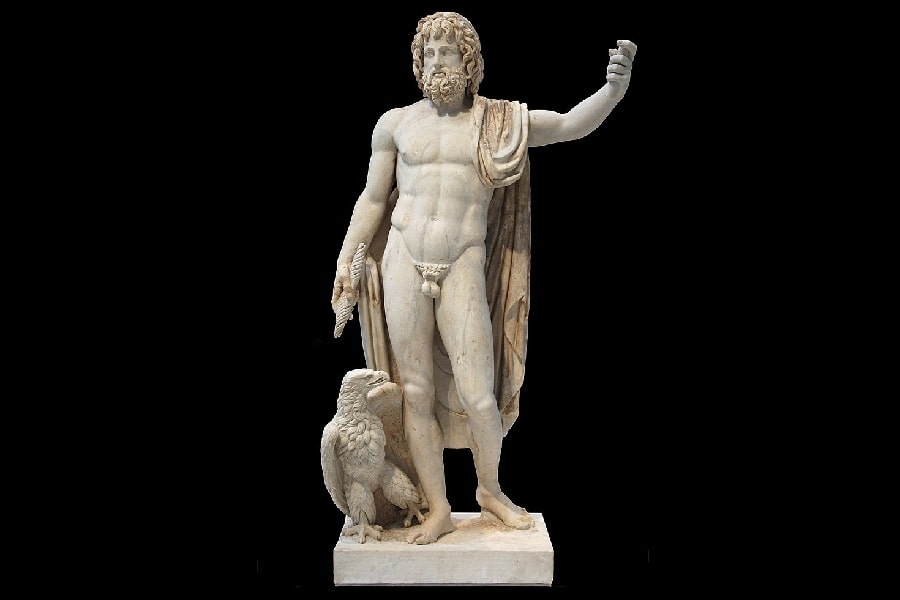
Name: Jupiter
Realms: Light, storms, thunder, and lightning
Family: Son of Saturn; husband of Juno; father of Minerva
Fun Fact: His supreme title was Jupiter Optimus Maximus, meaning the “Best and Greatest”
If the Roman gods ever competed in an Olympic-style competition, Jupiter wouldn’t be allowed to compete. If he did, there would be no competition. But why would Jupiter be the sole god standing on the podium each time? As it happens, this is the supreme god of the Romans and he’s unconquered in battle.
Gods fighting over laurel wreaths need a firm leader who can give them direction in the confusion. Indeed, the ancient Romans viewed Jupiter as the god who gave victory in battle and protected those who were defeated. In other words, the athletes can forget about cheating or kicking the losers.
Back in the day, this god was also the choice of Roman generals, because he symbolized a fearless army. Indeed, Jupiter was the stuff of warfare — he was the patron god of violence and treaties. He was also a political deity and the Senate would ask his blessing to declare war.
READ MORE: Jupiter: The Almighty God of Roman Mythology
**Back to Top**
Mars – The Ancient Roman God of War
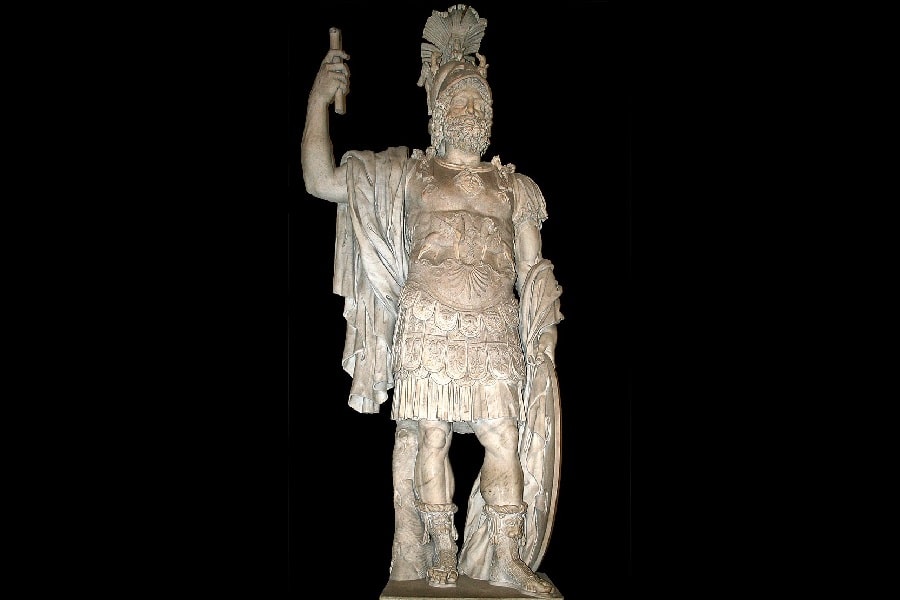
Name: Mars
Realms: War
Family: Son of Jupiter and Juno
Fun Fact: Mars was seriously unpopular with the other gods (probably because he liked the bloody side of life a little too much)
Rank-wise, the Roman god Mars was very important — he was second only to his father, Jupiter. Similar to Dad, Mars was also revered by the Roman military. But in his case, the god was more often worshiped by the soldiers.
His thing was standing for fighting power, as well as the hair-raising sounds and blood spraying everywhere in battle. Not a cute god, by any means, but anti-adorable deities have their purposes.
He protected the city of Rome, brought victory in their battles, and crushed rebellions among the nations they had already conquered. Mars was even the bodyguard of the Emperor (though he failed a bit with Julius Caesar).
As popular as Mars was among mortals, the Roman pantheon disliked his nature. His love of disaster and death was epic — which pretty much sums up why he semi-murdered every competitor in the Olympic martial arts events and literally brought down the house.
READ MORE: Mars: The Roman God of War
**Back to Top**
Pluto – The Mysterious Roman God of the Dead and Underworld
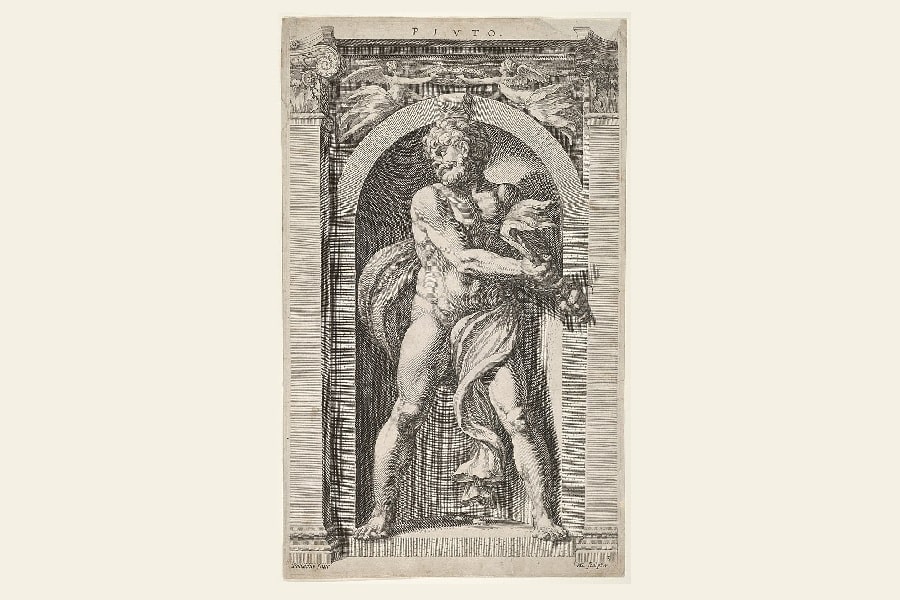
Name: Pluto
Realms: The underworld
Family: Son of Saturn and Ops; husband of Proserpine
Fun Fact: Pluto’s wardrobe includes a helmet of invisibility
In mythology, the underworld isn’t exactly the Ritz Hotel. But the Romans weren’t like other ancient civilizations who feared the depths beneath their feet and filled them with phantasms — their underworld also reflected the good that came from the earth; like precious metals and the growing seeds that provided food. The deity that ruled this realm was Pluto, the Roman god of death.
Most of the time, he lived in a palace and loved his wife. He was one of the few gods who remained faithful to his spouse. Outside of the home, Pluto collected the freshly deceased who arrived in the underworld via the River Styx.
He would then separate them into two groups — those who had lived good lives and spent eternity in the wonderful Elysian Fields, and those who had mucked up were forever tormented in the realm of Tartarus.
READ MORE: Pluto: The Roman God of the Underworld
**Back to Top**
Ops – The Goddess of Plenty
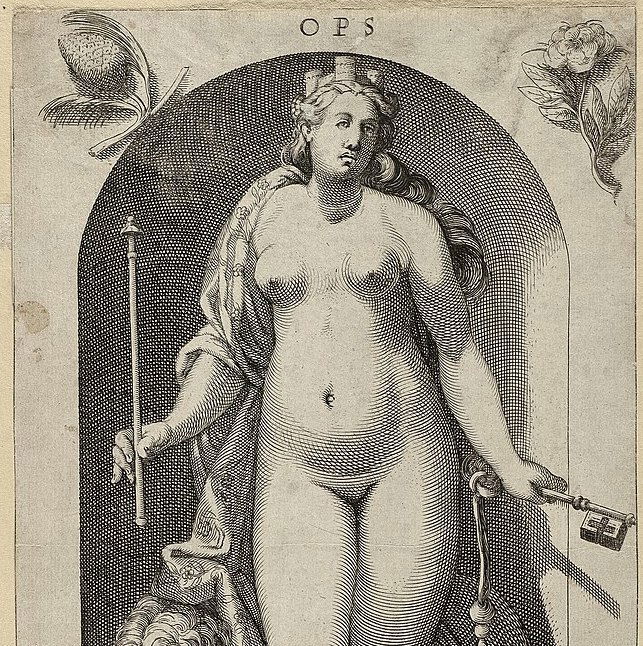
Name: Ops
Realms: Fertility, the Earth, Abundance
Family: Wife of Saturn; mother of Jupiter, Juno, Neptune, Ceres, Pluto, and Vesta
Fun Fact: To the Sabines, she was an Earth goddess
In Roman mythology, Ops was the goddess that had it all. Literally! As the goddess of plenty and abundance, she made sure that no one was found to be lacking. The cornucopia tucked beneath her arm is evident of that enough.
The matron of prosperity was celebrated during Opalia on the 25th of August and again on the 19th of December. The August festival marked the end of the harvest, while the one in December promoted the storage of grain. The festival was attended by the Vestal Virgins and priests from the cult of Quirinus. Moreover, a chariot race was held to commemorate the event.
Sources say that Ops is actually the Greek goddess Rhea. To be fair, they’ve never been seen in the same room…
**Back to Top**
Saturn – The Roman God of Agriculture
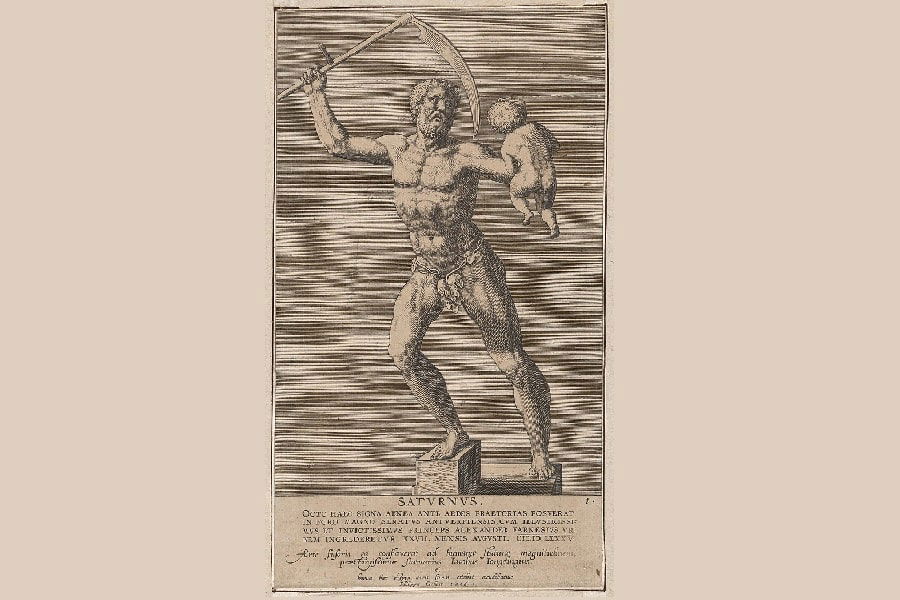
Name: Saturn
Realms: Agriculture
Family: Father of Jupiter and Pluto
Fun Fact: Saturday is named after this god
Saturn — the god of agriculture — was often associated with celebration. Food was important to the ancient Romans, as it should be, and so good harvests were often credited to Saturn.
After all, one of the most popular Roman festivals was held in his honor. During Saturnalia, people celebrated wildly and exchanged gifts for days. Kind of like Christmas on caffeine.
Saturn was also said to have had a direct influence on humans. He was the god who taught people how to behave with civility, and how to farm and grow vineyards. According to Roman mythology, he also ruled Latium for a while — the settlement that pre-dated Rome and stood where the city would be built in the future.
READ MORE: Saturn: Roman God of Agriculture
**Back to Top**
Vulcan – The God of Fire
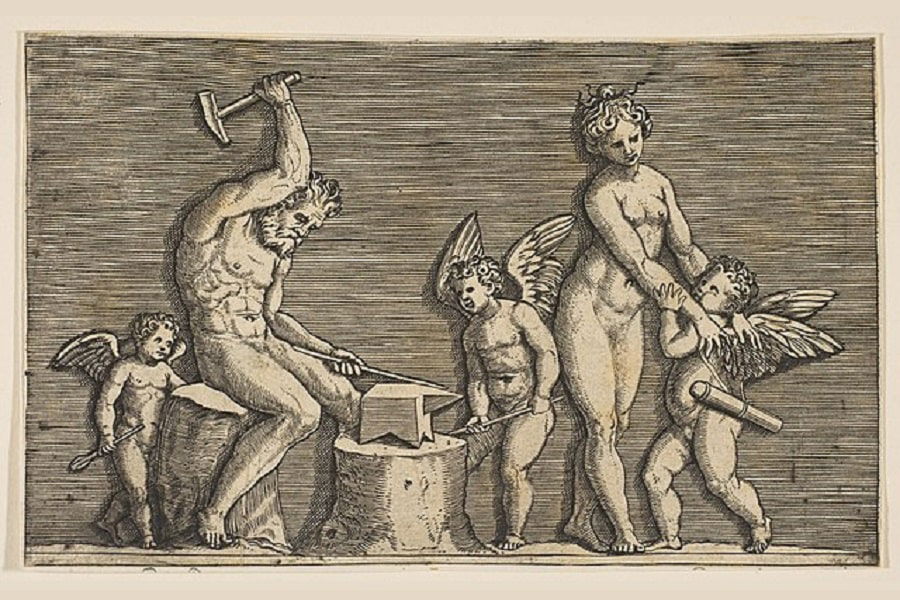
Name: Vulcan
Realms: Fire, Volcanoes, Deserts, Metalwork, blacksmiths
Family: Son of Jupiter and Juno; husband of Venus
Fun Fact: His mother abandoned him at birth because he was an ugly baby
The gods and goddesses of the Roman pantheon try to outdo each other with their creative abilities. But in the end, Vulcan is the clear winner.
According to Roman mythology, he invented a golden net that could entrap cheating spouses. He caught his wife and her lover, Mars, that way. As the most gifted blacksmith among the gods, he made jewelry desired by important goddesses like Juno, a golden slave-girl, and from clay, and the more famous Pandora.
For those who only want to catch one person, they can also buy Vulcan’s golden chair with mother-of-pearl inlays. It kept his own mother captive for days, so, you know, it works.
The ancient Romans linked Vulcan with Mount Etna. Whenever the volcano lost its top, it was said that Vulcan discovered Venus was having another affair and that he vented his anger in his workshop underneath the mountain.
READ MORE: Vulcan: The Roman God of Fire and Volcanoes
**Back to Top**
Neptune – The Ruler of Oceans and Seas
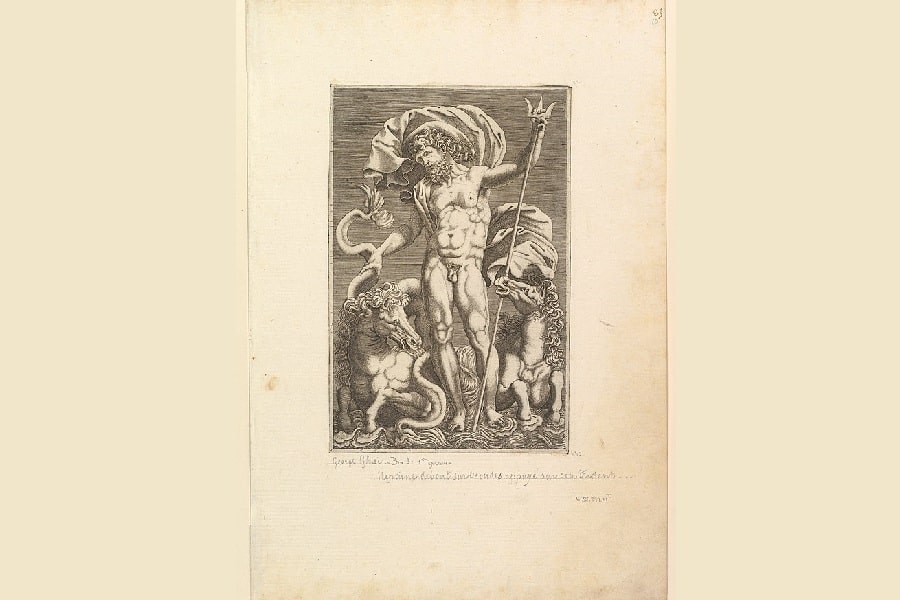
Name: Neptune
Realms: The ocean, horse racing
Family: Son of Saturn and Ops
Fun Fact: In Latin, Neptune’s name means “Moist”
Unlike Pluto, Neptune didn’t honor his marriage vows. He had a respectable three kids with his wife and then fathered a legion of offspring with other ladies.
The most famous of his brood was the flying horse Pegasus. But if this bizarre sport wasn’t in the God Games — and if Mars wasn’t so strong — then Neptune would’ve won all the martial arts medals. This sea-dwelling god has a mean temper.
The ancient Romans thought that storms at sea and earthquakes happened when Neptune had a fit of rage. They also believed that he decided the outcome of all their maritime battles. So, to keep him sweet, the Romans built temples in his honor and filled them with special gifts.
Interestingly, this god is linked with horse racing. This stems from the earliest art showing Neptune enjoying a horse-drawn chariot ride across the waves, whereas later art had the chariot removed and the surrounding waves filled with creatures such as dolphins and fish.
READ MORE: Neptune: Roman God of the Sea
**Back to Top**
Luna – The Goddess of the Moon
Name: Luna
Realms: The Moon
Family: Sister of Sol
Fun Fact: Luna also functions as an epithet for other moon goddesses like Diana and, occasionally, Juno
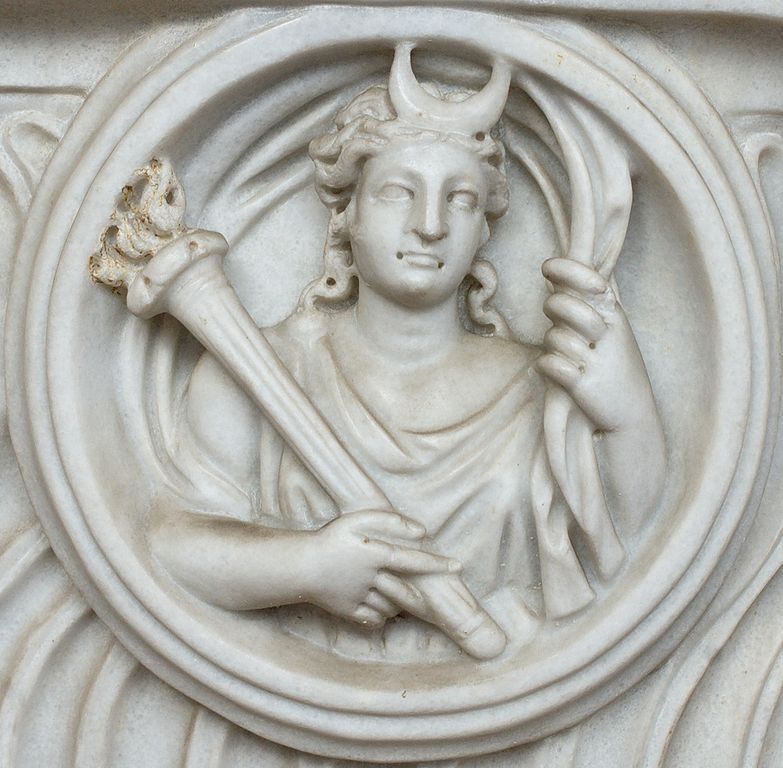
As a goddess within the Roman Empire, Luna was the feminine embodiment of the moon itself. She is connected to the Greek goddess Selene, whose myths she shares. She is thought to be a goddess of Sabine origin, having been implemented by the legendary King of the Sabines, Titus Tatius, into broader Rome.
**Back to Top**
Sol – The God of the Sun
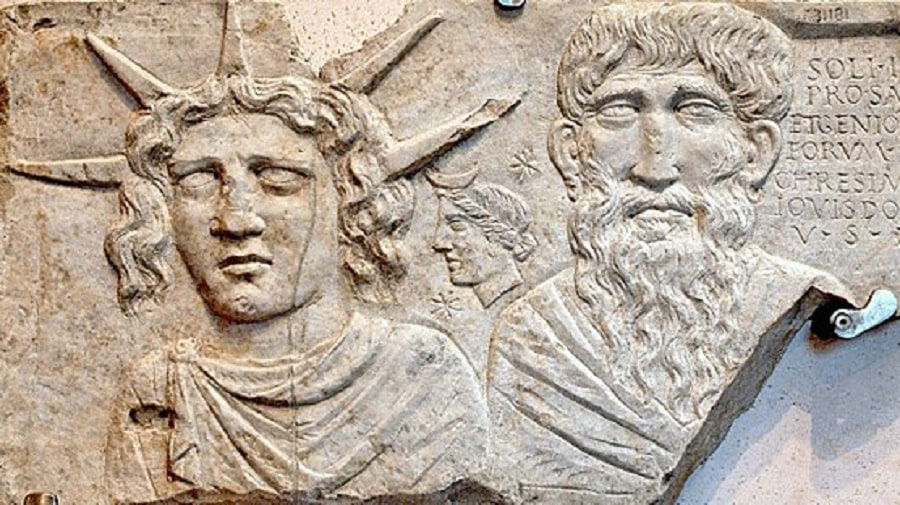
Name: Sol
Realms: The Sun
Family: Father of Circe, a woman who lived near Rome
Fun Fact: The cult of Sol’s festival on December 25th might have influenced the origins of Christmas
The Roman sun god is a sticky wicket. Most scholars agree that his name was Sol, however, the origins and number of appearances of this god in Roman mythology are far from settled.
Some say that the Romans worshiped two solar deities. They weren’t adored at the same time, though — Sol Invictus followed the Sol Indiges after the latter faded from favor. Invictus was apparently the heavyweight with the most fans.
But many modern researchers believe that the cult of Sol never had two gods and that, actually, the different names never existed either. It was just Sol.
At least Roman sources can add some weight as to when the Sun god became important. Apparently, Titus Tatius introduced Sol worship right after Rome was founded. Some of Sol’s temples remained in use for centuries.
Festivals and sacrifices were also made, testifying just how much the deity meant to Roman civilization. This is a little weird because personal facts about this fiery character are hard to come by.
At least Roman sources can add some weight as to when the Sun god became important. Apparently, Titus Tatius introduced Sol worship right after Rome was founded. Some of Sol’s temples remained in use for centuries.
Festivals and sacrifices were also made, testifying just how much the deity meant to Roman civilization. This is a little weird because personal facts about this fiery character are hard to come by.
**Back to Top**
Mercury – The God of Commerce, the Protector of Merchants and Travelers
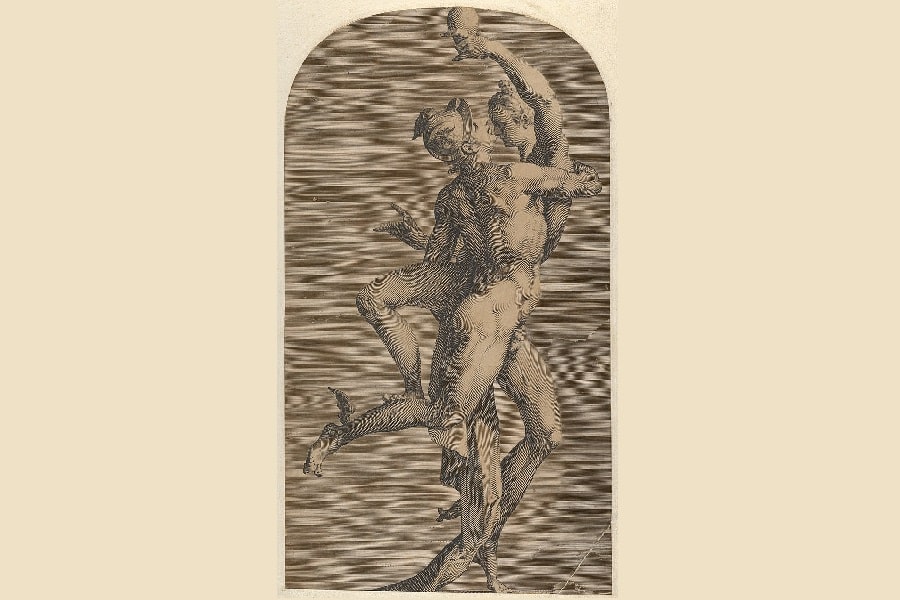
Name: Mercury
Realms: Thieves, cheats, travelers, commerce, shepherds, and messages
Family: Son of Jupiter and Maia
Fun Fact: Mercury has a bad habit of stealing cattle
Mercury’s day job is to take the dead to Pluto’s underworld. He’s also tasked with protecting travelers, and merchants, and taking a few messages between the gods. Once he clocks off for the day, though, Mercury has a darker side to him.
This Roman god likes to steal things. In fact, he’s such a master thief that his realm specifically protects those with sticky fingers. Cheaters are welcome, too.
Since the gods tend to punish such characters, it makes sense that Mercury is also the mediator between the pantheon and humans. He even has a special wand called the “caduceus” to resolve conflicts. It certainly came in handy after he swiped the small tower of laurel crowns from Mars’ head, after the last competition.
READ MORE: Mercury: Roman God of Trade and Commerce
**Back to Top**
Venus – The Goddess of Love, Beauty, Desire, and Fertility
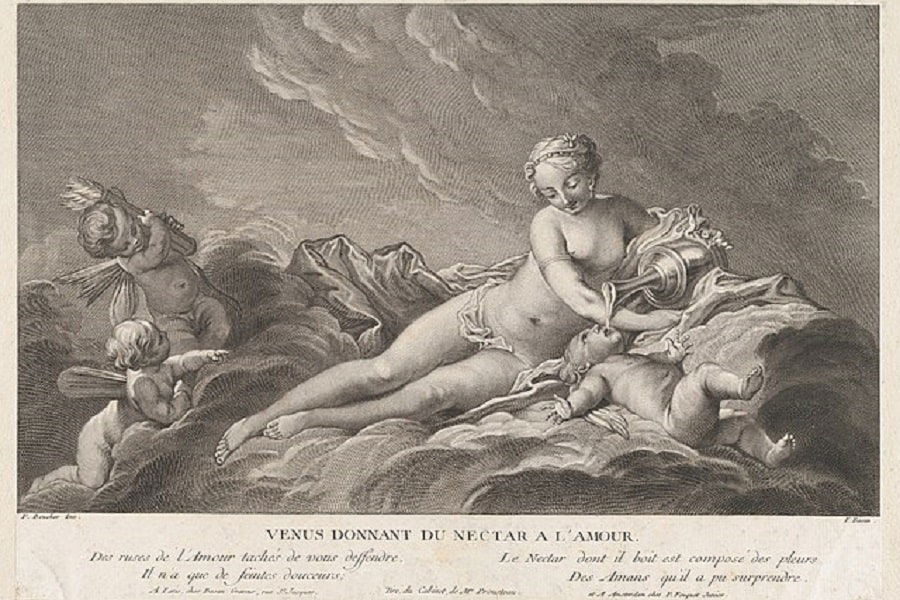
Name: Venus
Realms: Goddess of love, fertility, beauty, victory, and prosperity
Family: Mother of Cupid; married to Vulcan
Fun Fact: Two of her stranger symbols are mirrors and girdles
This Roman goddess was exceptionally important. Leaders like Julius Caesar claimed her as an ancestor and mythology often depicts her as the mother of Rome. People sought a direct way of being with this goddess, and that’s why statues of Venus received special treatment.
During her festivals, her carvings and worshippers both wore wreaths of myrtle — an important symbol associated with her. Husbands and wives asked Venus for advice about relationships. Her temples were also important to new brides; they would offer the goddess of love their childhood toys before getting married.
In a way, Venus was also a political goddess. After Julius Caesar said she was his great-great-great-grandmother-twice-removed, other politicians followed suit. But not all of them claimed to be her descendants. Instead, they went all out to curry her favor with grand gestures.
One of the biggest was a brand-new temple in 217 BC. That year, the Roman army had their butts handed to them in a critical battle. They were convinced the reason wasn’t their fighting skills — it was because Venus liked the enemy more. Most other deities would’ve been ditched, but the temple was an attempt to win her back; Venus was that important to Roman culture.
READ MORE: Venus: The Mother of Rome and Goddess of Love and Fertility
**Back to Top**
Juno – The Queen to All the Deities
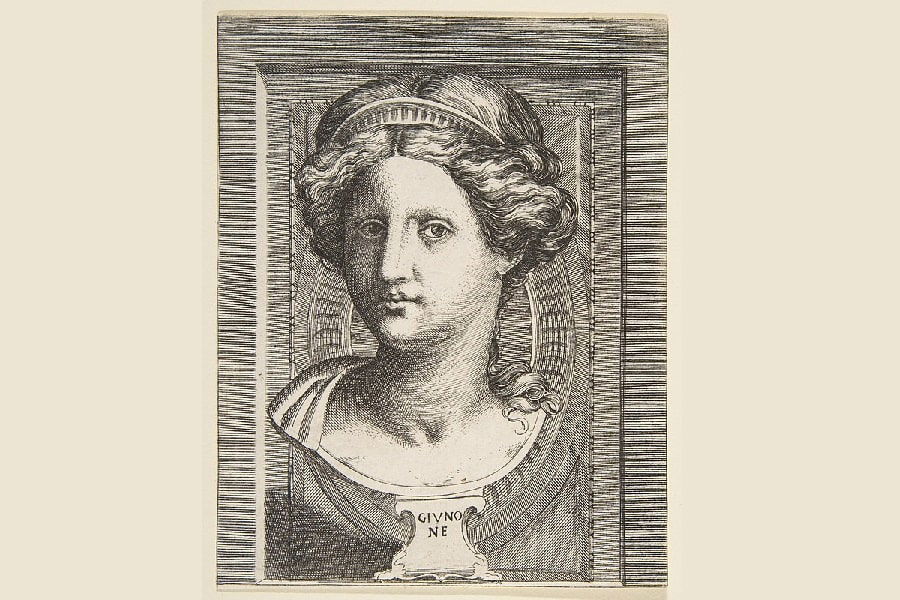
Name: Juno
Realms: Women, childbirth, guardian of the Roman people
Family: Married to Jupiter; mother of Vulcan and Mars
Fun Fact: Her husband was also her twin brother
Another important Roman goddess is Juno — the queen of the gods and Jupiter’s wife. She was known for two things. In the past, the Romans saw her as their personal protector but she was particularly involved in the affairs of women.
Just to be clear, not the Venus-cheating-on-Vulcan kind of affairs. Nope. Juno ruled over the realms of childbirth, motherhood, marriage, and pregnancy.
This goddess was also the guardian of funds. The first Roman coins were forged at her Temple of Juno Moneta and the mint operated for 400 years. That’s more successful than most businesses these days. This history won her company — Goddesses Be Like Printing Stuff Inc. — the contract to produce the wreaths and trophies for the Olympic Games.
Just don’t join the gossip that Juno got the deal because she’s married to the most powerful Roman god. Her war-like nature might surface and make her charge at you with her peacock-drawn chariot. It’s deadlier than it sounds. Juno’s got a spear and she’s not afraid to use it.
READ MORE: Juno: the Roman Queen of the Gods and Goddesses
**Back to Top**
Cupid – The God of Love and Desire
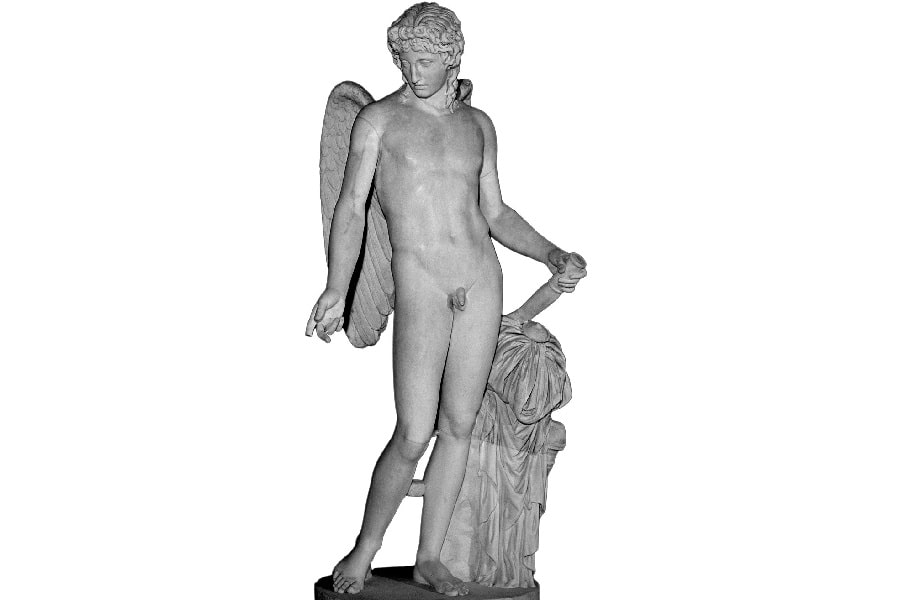
Name: Cupid
Realms: God of love
Family: Son of Venus and Mars
Fun Fact: He resurrected his dead love interest, Psyche, by shooting her with an arrow
Just like Mercury, Cupid moonlights on the side. But while Jupiter is lenient with Mercury’s thieving ways — it’s his realm, after all — the king of the Roman gods would surely smite Cupid if his betting business comes to light. It’s true, if you pay Cupid enough, he’ll swing the odds of a match in your favor.
You see, his arrows can either make people fall madly in love or push them apart — golden-tipped brings a fevered obsession (in this case, helping to win that race at all costs) while lead-tipped makes someone bail on a relationship (or a competition).
Thus far, he’s been getting away with it because darn it, he’s chubby and cute, and nobody suspects that the star of Valentine’s Day is an accomplished criminal during the Games (to be fair, he only goes gangsta every four years or so).
**Back to Top**
Juventas – The Goddess of Youth and Rejuvenation
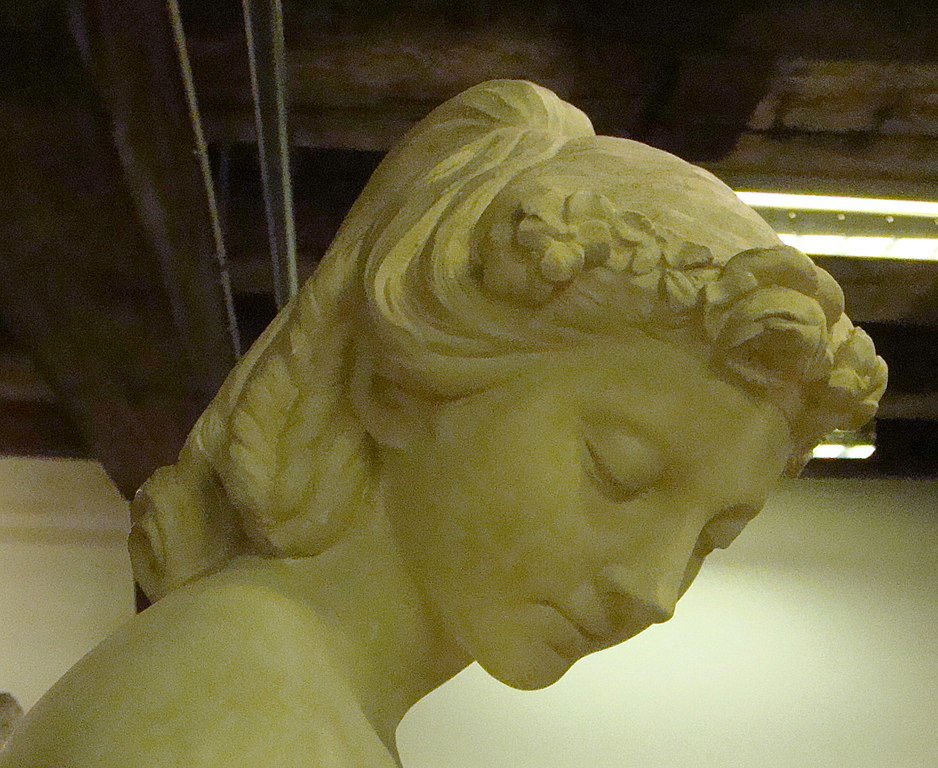
Name: Juventas
Realms: Youth, Rejuvenation, Coming-of-Age
Family: Daughter of Jupiter and Juno; sister of Mars, Vulcan, Bellona, Discordia, Lucina, Minerva, Mercury, Diana, and Phoebus
Fun Fact: She sky-rocketed in popularity during the Second Punic War
This young goddess was was worshiped according to the ritu graeco, or Greek rites. This has to do with her associations with the Greek goddess, Hebe, who became the wife of Heracles in Greek mythology. By virtue, Juventas was married to his Roman equivalent, Hercules.
**Back to Top**
Minerva – The Goddess of Wisdom, Poetry, and Crafts
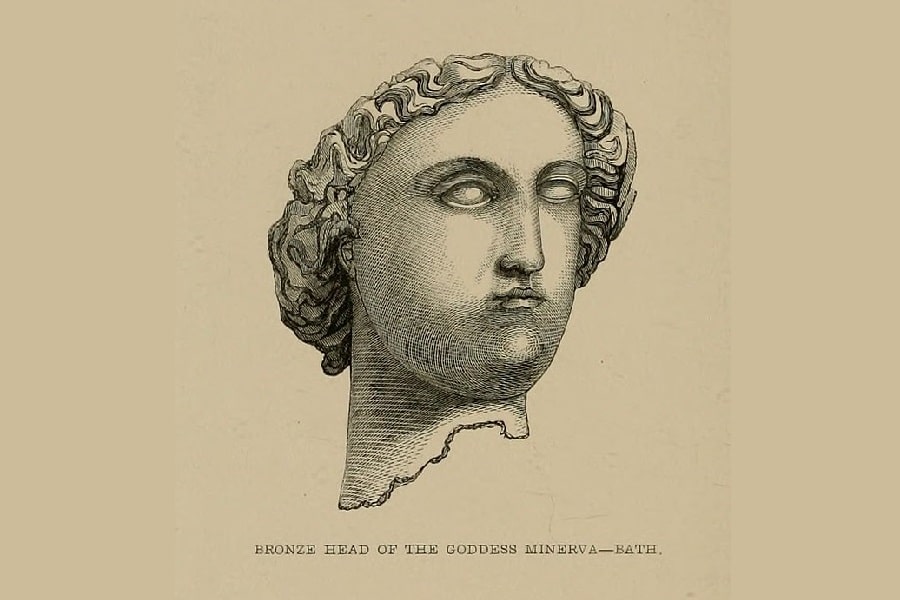
Name: Minerva
Realms: Goddess of wisdom, olive trees, poetry, crafts, medicine, the arts, trade, and warfare
Family: Daughter of Jupiter and Metis
Fun Fact: She once turned a woman into a spider for daring the goddess to a weaving contest
This goddess is talented in many realms. Indeed, Ovid called her the “goddess of a thousand works.”
In the past, Minerva was also among the three most important deities worshiped by the Romans, the other two being Jupiter and Juno.
Interestingly, she was a rare Roman goddess in the sense that she wasn’t borrowed from Greek mythology — the original Minerva was an Etruscan deity called Meneswa.
READ MORE: Minerva: Roman Goddess of Wisdom and Justice
**Back to Top**
Lucina – Roman Goddess of Childbirth, Midwives, and Infants
Name: Lucina
Realms: Childbirth, midwifery, midwives, infants, mothers
Family: Daughter of Jupiter and Juno; sister of Mars, Vulcan, Bellona, Discordia, Juventas, Minerva, Mercury, Diana, and Phoebus
Fun Fact: Of all the deities related to childbirth, Juno Lucina reigned supreme
According to the Romans, Lucina functioned similarly to her Greek equivalent, Eileithyia. A woman in the throes of birthing pains can trust her to offer relief. Otherwise, lucina acts as an epithet, applicable to both Diana and Juno for their roles in childbearing. The epithet relates to the light of the moon, whose cycles were used to track fertility and pregnancy.
**Back to Top**
Diana – The Goddess of the Hunt and Wildlife
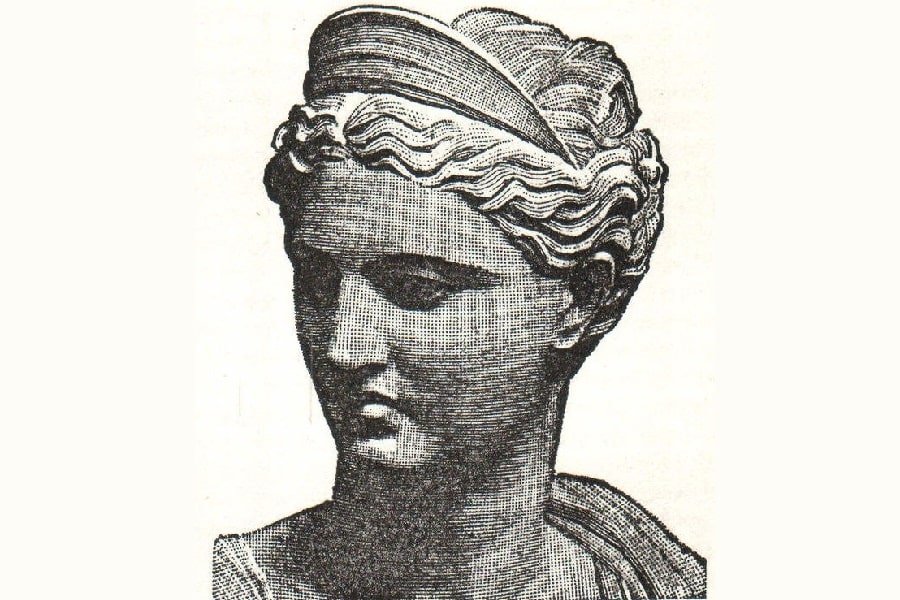
Name: Diana
Realms: Hunting, wildlife, the woods, chastity, the Moon, fertility, children, childbirth, mothers, light
Family: Daughter of Jupiter and Latona; twin sister of Apollo
Fun Fact: She was one of three Roman goddesses who vowed never to marry
Diana might’ve lost her mind a little. As the goddess of the hunt, her killer instinct is triggered by movement and rustling foliage.
With her is Orion, a companion she once accidentally killed in mythology; as a way to say “oops,” she turned him into the famous constellation. Her party also includes maidens, hounds, and deer. Diana controls woodland animals, so if anyone can set killer deer on their fellow deities, it’s this goddess.
She is also often found with Virbius, a midwife and a close friend of Diana’s.
There’s a good reason why the goddess is associated with this nurse — she might be an active hunter and ender of lives, but she also stands at the point where life begins. Roman wives prayed to Diana when they wished to conceive. She also kept pregnant ladies, mothers, and their offspring safe.
Diana is the moon deity. Together, with her realms of hunting and wild animals, this earned her the ancient title of the Triple Goddess. Interestingly, one of her other realms involved something you don’t see every day with sacred pantheons — she was the protector of slaves.
This aspect of her was so honored during ancient times that one of her temples only employed a former runaway slave as the high priest. In fact, all temples honoring this goddess provided sanctuary to any slave who needed protection.
READ MORE: Diana: Roman Goddess of the Hunt
**Back to Top**
Phoebus – The God of Light, Music, and Medicine
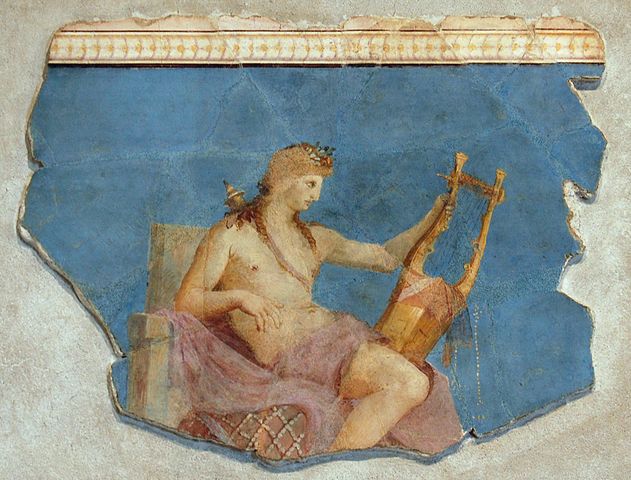
Name: Phoebus (Apollo)
Realms: Sunlight, music, medicine, science, poetry, pestilence, prophecy
Family: Son of Jupiter and Latona; brother of Diana
Fun Fact: Romans adopted him into their pantheon after a deadly plague swept through the Empire
Entering in as the other half of the divine twins is Phoebus Apollo! The only reason we can really see this god is because of the light radiating from him. He’s also strumming his lyre, so there’s that. He’s hard to lose, even in the overgrown plants.
His twin sister, Diana, has taken note of Phoebus as she stalks through the brush, but she’d never strike against him. In case she ever thought to, the Muses dancing around him acted as a buffer. Mercury was never too far from his dear half-brother, so he’d intervene as well – probably, at least. His humor is something else.
Thankfully for Phoebus Apollo, Diana would never do him harm. As twins, they had a unique bond; moreover, their father leaving them high and dry in their youth brought them closer together. When Jupiter did decide to get involved with his twins, he showered them with gifts and favors. In case it isn’t evident in the way Jupiter looks back at his strumming son, Phoebus is often thought to be his favorite child, second only to Minerva.
**Back to Top**
Vesta – The Virgin Goddess of Health, Home, and Family
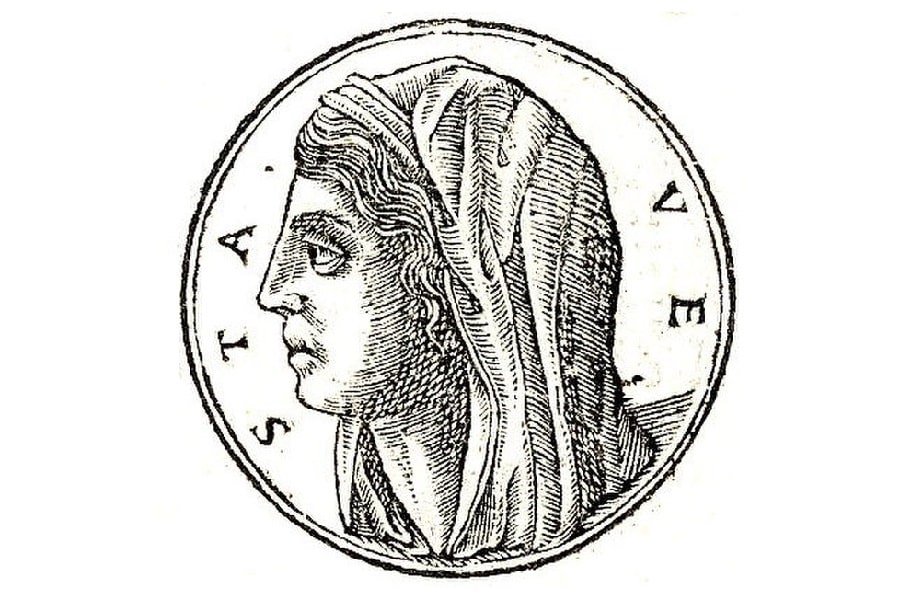
Name: Vesta
Realms: Domestic life, domestic bliss, the home, the hearth, protector of Rome
Family: Eldest sister of Jupiter; daughter of Saturn
Fun Fact: She’s considered both the youngest and the oldest of the gods
Elite beings need a comfy place to stay and a matronly figure to look after them. The best Roman goddess for this task is Vesta. She tended to Jupiter’s home as a favor after he got rid of all her unwanted suitors and this arrangement set the tone for her realms. But she was nobody’s doormat.
The goddess Vesta was highly revered by the Roman people. Just to give you an idea of her worth — she was the only deity in the Roman pantheon who had her own full-time clergy in Rome. They were devoted solely to the rituals and rites that honored her.
The ancient Romans believed that fire burned only because Vesta willed the flames to stay active in the hearth. The latter brought warmth to the house, provided hot water and food, and marked the most important room in the home where fire sacrifices often happened. Since every dwelling had one, the poor and rich alike felt the presence of Vesta.
Another aspect that made Vesta so unique was an order called the Vestal Virgins. These women worked at the shrine of Vesta inside the Roman Forum, and they famously tended to a fire that wasn’t allowed to snuff out. While these ladies held an honorable position, their job came with a dangerous caveat — they were expected to stay celibate.
The punishment for breaking this vow was death. Not a quick smash to the skull, either. Nope. A Vestal Virgin found guilty of being unchaste was buried alive. Even worse, one horrifying historical account tells of a woman who had molten lead poured down her throat.
READ MORE: Vesta: The Roman Goddess of the Home and the Hearth
**Back to Top**
Liber – The God of Wine, Fertility, and Freedom
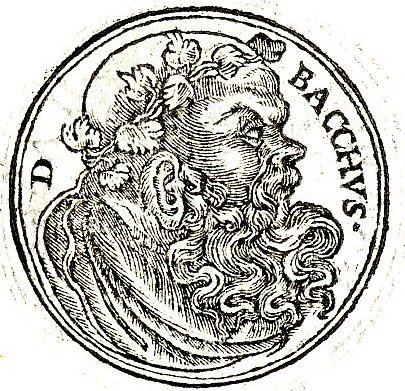
Name: Ceres
Realms: Goddess of motherly love, grain, and agriculture
Family: Daughter of Saturn and Ops; sister of Jupiter; mother of Proserpine
Fun Fact: This goddess inspired a common saying. When the Romans thought something was fantastic, they would say it was “Fit for Ceres”
Liber is the patron god of plebians, those in Roman society that were free citizens, but not patricians. They had to work for their keep and pay taxes. Most plebeians were farmers, craftsmen, and laborers. By comparison, the patricians were wealthy landowners whose families were shown favor by the emperor.
Amongst the Roman deities, Liber was closely associated and virtually interchangeable with the god Bacchus. Meanwhile, Bacchus was largely tied to the Greek god Dionysus. Over time, the three came to share most of their myths.
As a representative of the largest social class within the Roman Empire, Liber became the face of plebian commoner disobedience. Acts against established civil and religious orders were thought to be encouraged by the god, who strongly opposed dependent servitude. Likewise, as the god of wine and its production, Liber was the party guy. No wonder he’s out here popping celebratory corks!
**Back to Top**
Ceres – The Goddes of Harvest and Agriculture
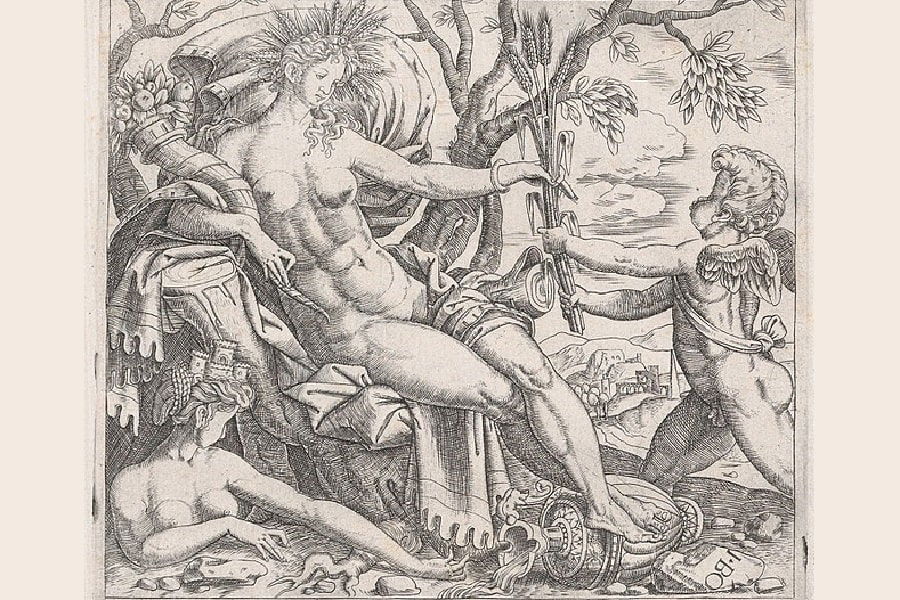
Name: Ceres
Realms: Goddess of motherly love, grain, and agriculture
Family: Daughter of Saturn and Ops; sister of Jupiter; mother of Proserpine
Fun Fact: This goddess inspired a common saying. When the Romans thought something was fantastic, they would say it was “Fit for Ceres”
The ancient Romans adored Ceres. She was the only deity who cared enough about them to stay involved in the most ordinary parts of their lives.
Other gods mingled with mortals when it suited them or when they felt one person was “special.” But Ceres was like a mother to humanity. She was also revered for the priceless gifts she was said to have given mankind, including fertile soil, harvests, and teaching the first farmers.
According to Roman mythology, the bond between Ceres and her daughter is responsible for the seasons. After Proserpine was kidnapped by Pluto and taken to the underworld, Ceres was ticked right off. She was angry because Proserpine’s father, Jupiter, had given Pluto permission to abduct their daughter. But she knew how to get even.
Ceres went to live between men and disguised herself as an elderly woman. During that time, she stunted the growth of all harvests, and famine consumed the lands. Jupiter relented and ordered the release of Proserpine. However, this was a bit complicated — she had nibbled on some underworld food and that linked her to Pluto forever.
So, every year, for a few months, she must return to him. Proserpine did actually grow to love him eventually, but whenever she’s gone, her mother ceases to feel charitable with nature (basically, we can blame Stockholm Syndrome for autumn and winter). When her daughter returns, Ceres is so overjoyed that spring flowers again across the land.
**Back to Top**
Proserpina – Queen of the Underworld and Goddess of Spring
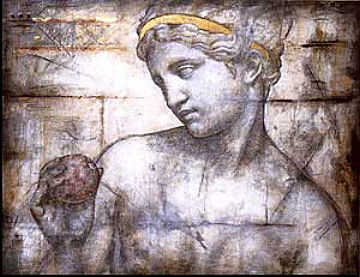
Name: Proserpina
Realms: Springtime, female fertility, agriculture
Family: Daughter of Ceres; sister of Liber; wife of Pluto
Fun Fact: Though Proserpina was the better-known name, this goddess also went by Libera
Proserpina sits between her doting mother, Ceres, and her ever-working husband, Pluto. She seems content sandwiched between them, though the strained look that clouds her face now and again says otherwise. To be fair, when it comes to Proserpina, Fortuna really did a doozy on her.
First off, Jupiter was her father. Big oof right off the bat. Then, while she was happy living and working with her mother, Jupiter gave his brother (her uncle) his consent to marry her. And the betrothal wasn’t a sweet gesture, even by Roman standards.
No, Pluto went ahead and kidnapped his niece because Jupiter gave him the a-OK. Ceres was devastated, to say the least. Luckily, the goddess of grain is quite persuasive. A bit of famine here, an unforgiving winter there, and boom, Proserpina was allowed to return.
Little did anyone know until after the fact, Proserpina snacked a bit during her captivity in the Underworld. Rules as written, she would have to return and be with Pluto. Perhaps it’s a good thing that the mysterious god of the dead grew on her and they would go on to have a loving marriage.
If you haven’t noticed, the story of the seasons translates quite nicely between Greek and Roman mythology. Although the two cultures had close communications with one another, with Greece coming under Roman rule in 146 BCE, they still developed somewhat independently. It is only after the spread of Hellenism that many Greek gods, like Persephone, become interchangeable with their Roman equivalent, like Proserpina.
One standout fact about Proserpina is that she has a single brother, Liber, whereas the Greek goddess Persephone does not. Persephone has several siblings between her mother and father, though the revelry god Liber is all Proserpina has. Not a huge deal, save for the major Roman agricultural triad consisting of Ceres, Proserpina, and Liber.
**Back to Top**
Caelum – The God of the Sky
Name: Caelum, Caelus
Realms: The sky and heavens
Family: Husband of Tellus; father of Saturn, Ops, and Janus
Fun Fact: Caelus didn’t have a cult in Rome
It’s true that after Caelum’s deposition at the hands of his son, Saturn, the divine family hasn’t been the same. While he’s still the “Sky Father” to us, not much can be said about his familial relations. Whatever they may be, his relationship with his descendants can be described as estranged at best.
According to ancient Roman religion, Caelum was as much of a deity as he was a physical place where the other Roman gods and goddesses lived. Whereas his counterpart is the Earth, Caelum is the sky itself. Even Varro, a prolific author and Roman polymath, states that the Greeks refer to the former ruler of the gods as “Olympus.”
Fortuna – The Goddess of Fortune, Luck, and Fate
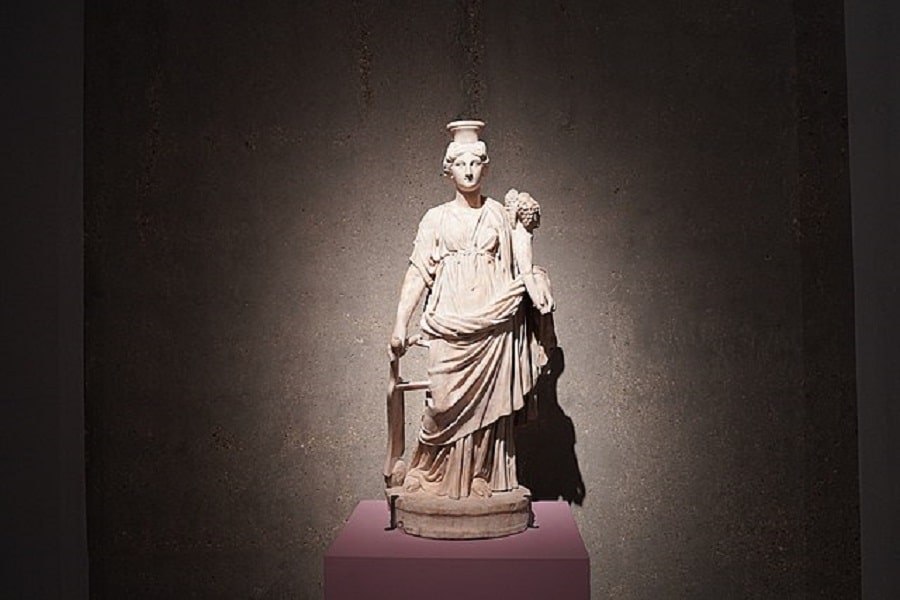
Name: Fortuna
Realms: The goddess of fortune, chance, destiny, and prophecy
Fun Fact: Even though her name is not among the more well-known Roman gods today, Fortuna was once widely worshiped in Italy
Fortuna is often found sitting on a ball while holding a ship’s rudder and a cornucopia.
She also wears face paint that makes her look like a clown. But her behavior isn’t purely an act to provide the crowd with entertainment at half-time. She’s the one who sprinkles competitors with good or bad luck. In other words, Fortuna could give you the laurel crown or just as easily hand it over to the other guy.
She balances on a ball to show the precarious nature of chance. You can stay on top of things or fall flat on your face. The rudder symbolizes her control over destiny, steering it like a ship through the stormy seas of life. The cornucopia shows that she’s the giver of abundance — which could be the reason why some thought Fortuna was also a fertility goddess. You know, abundant crops and kids. Sometimes you get them, and sometimes you don’t.
On top of all that, Fortuna was an oracle deity. People consulted her in various ways to get a handle on whatever disaster or blessing might’ve awaited them. Fortuna wasn’t some two-bit fortune teller, either. At Antium and Praeneste, this Roman goddess had two famous shrines that served as oracular seats.
**Back to Top**
Faunus – The God of the Forests and Fields
Name: Fortuna
Realms: The goddess of fortune, chance, destiny, and prophecy
Fun Fact: Even though her name is not among the more well-known Roman gods today, Fortuna was once widely worshiped in Italy
Without Faunus, nature would be twice as hostile and any attempts to keep the nature spirits at bay would end in embarrassment. They have a penchant for mischief, especially the Fauni, and only ever seem to really respect ol’ Faunus.
Ever the wild card, Faunus is also an oracular deity. If someone so happened to fall asleep within his precinct while snuggled up to some sacred sheep skin, they can expect a prophetic dream or two. However, only ever in poetic verse. It’s the rules.
In case you were wondering, yes – those do happen to be sheepskin in that field. No, you probably shouldn’t sleep on them. He may tell you who will win which events, and what would the fun in that be?
**Back to Top**
Somnus
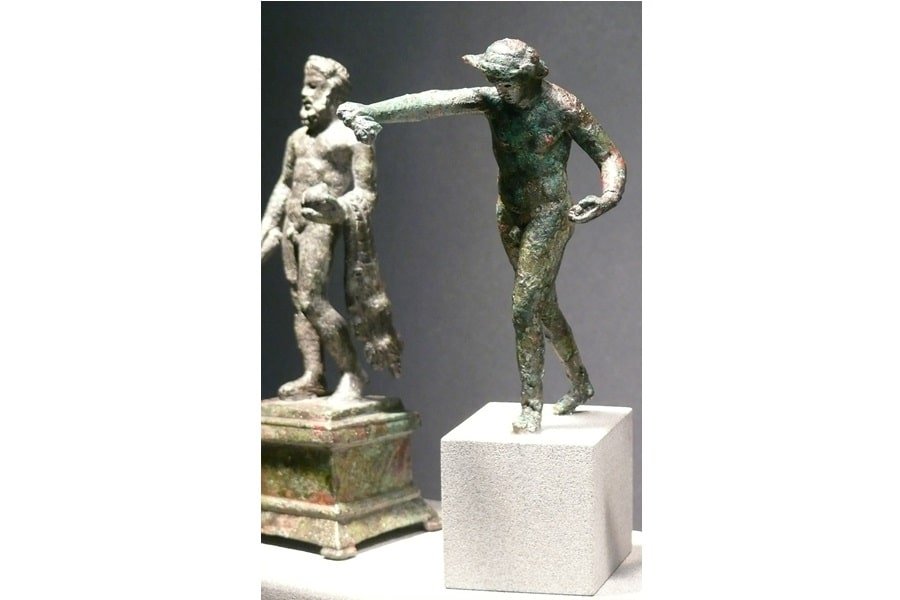
Name: Somnus
Realms: As the god of sleep, Somnus was associated with bringing a peaceful and restful slumber. His influence extended to both humans and gods, and his realm was considered a tranquil place.
Fun Fact: In Roman mythology, Somnus was the god of sleep. He was the equivalent of the Greek god Hypnos.
Somnus was typically considered the son of Night (Nox) and Darkness (Erebus). In some accounts, his siblings included other personifications such as Death (Mors) and Dreams (Morpheus).
As the god of sleep, Somnus was associated with bringing a peaceful and restful slumber. His influence extended to both humans and gods, and his realm was considered a tranquil place.
In art, Somnus was sometimes portrayed as a winged deity, emphasizing his ability to swiftly bring the gift of sleep. Other representations might highlight his connection to the night, often depicted with symbols such as poppies, which were associated with sleep and dreams.
The Roman poet Ovid, in his work “Metamorphoses,” provides various stories involving Somnus and his influence on both gods and mortals. Somnus played a role in several myths, showcasing the importance of sleep and dreams in the ancient Roman understanding of the world.
**Back to Top**
Roman Deities and Christianity
The worshipping of the Roman pantheon lasted a long time. But the gods stopped dwelling in the people’s hearts and minds when the Roman Empire crumbled in the fifth century AD. Christianity grew stronger and believers eventually extended to emperors.
One of them, Theodosius I, put his shoulder behind the effort to rid the Romans of their gods. He closed the temples, banned any admiration for the old pantheon, and disbanded the Vestal Virgins. That last one is a little sad if you consider the fact that their order kept Vesta’s fire alive for almost a thousand years.
But oh, happy day — the most draconian efforts couldn’t wipe Roman mythology off the map. The legends of the gods and goddesses survived the purge and the centuries that followed.
Even today, they have a strong influence on modern culture — especially in astronomy. Mars, Jupiter, Neptune, Venus, and Mercury all gave their names to planets in our solar system.
You haven’t met all the Roman gods and goddesses today. Plenty more swish around the internet, in books, and even as characters in movies. Hopefully, their rich legends and lives have whetted your appetite to hunt down the rest — just imagine that you’re Diana with her bow. Go plonk arrows in a few gods out there! But if you accidentally kill one of them, then you never received any hunting advice here.